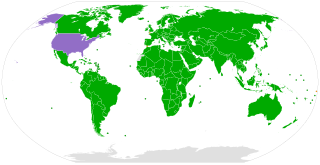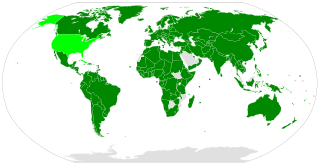International human rights instruments are the treaties and other international texts that serve as legal sources for international human rights law and the protection of human rights in general. There are many varying types, but most can be classified into two broad categories: declarations, adopted by bodies such as the United Nations General Assembly, which are by nature declaratory, so not legally-binding although they may be politically authoritative and very well-respected soft law;, and often express guiding principles; and conventions that are multi-party treaties that are designed to become legally binding, usually include prescriptive and very specific language, and usually are concluded by a long procedure that frequently requires ratification by each states' legislature. Lesser known are some "recommendations" which are similar to conventions in being multilaterally agreed, yet cannot be ratified, and serve to set common standards. There may also be administrative guidelines that are agreed multilaterally by states, as well as the statutes of tribunals or other institutions. A specific prescription or principle from any of these various international instruments can, over time, attain the status of customary international law whether it is specifically accepted by a state or not, just because it is well-recognized and followed over a sufficiently long time.

The United Nations Convention on the Rights of the Child is an international human rights treaty which sets out the civil, political, economic, social, health and cultural rights of children. The convention defines a child as any human being under the age of eighteen, unless the age of majority is attained earlier under national legislation.

The International Covenant on Civil and Political Rights (ICCPR) is a multilateral treaty that commits nations to respect the civil and political rights of individuals, including the right to life, freedom of religion, freedom of speech, freedom of assembly, electoral rights and rights to due process and a fair trial. It was adopted by United Nations General Assembly Resolution 2200A (XXI) on 16 December 1966 and entered into force on 23 March 1976 after its thirty-fifth ratification or accession. As of June 2024, the Covenant has 174 parties and six more signatories without ratification, most notably the People's Republic of China and Cuba; North Korea is the only state that has tried to withdraw.
The United Nations Human Rights Committee is a treaty body composed of 18 experts, established by a 1966 human rights treaty, the International Covenant on Civil and Political Rights (ICCPR). The Committee meets for three four-week sessions per year to consider the periodic reports submitted by the 173 States parties to the ICCPR on their compliance with the treaty, and any individual petitions concerning the 116 States parties to the ICCPR's First Optional Protocol. The Committee is one of ten UN human rights treaty bodies, each responsible for overseeing the implementation of a particular treaty.

The Convention Against Torture and Other Cruel, Inhuman or Degrading Treatment or Punishment is an international human rights treaty under the review of the United Nations that aims to prevent torture and other acts of cruel, inhuman, or degrading treatment or punishment around the world.

The International Covenant on Economic, Social and Cultural Rights (ICESCR) is a multilateral treaty adopted by the United Nations General Assembly (GA) on 16 December 1966 through GA. Resolution 2200A (XXI), and came into force on 3 January 1976. It commits its parties to work toward the granting of economic, social, and cultural rights (ESCR) to all individuals including those living in Non-Self-Governing and Trust Territories. The rights include labour rights, the right to health, the right to education, and the right to an adequate standard of living. As of February 2024, the Covenant has 172 parties. A further four countries, including the United States, have signed but not ratified the Covenant.
Economic, social and cultural rights (ESCR) are socio-economic human rights, such as the right to education, right to housing, right to an adequate standard of living, right to health, victims' rights and the right to science and culture. Economic, social and cultural rights are recognised and protected in international and regional human rights instruments. Member states have a legal obligation to respect, protect and fulfil economic, social and cultural rights and are expected to take "progressive action" towards their fulfilment.

The International Bill of Human Rights was the name given to UN General Assembly Resolution 217 (III) and two international treaties established by the United Nations. It consists of the Universal Declaration of Human Rights, the International Covenant on Civil and Political Rights with its two Optional Protocols and the International Covenant on Economic, Social and Cultural Rights. The two covenants entered into force in 1976, after a sufficient number of countries had ratified them.
The Committee on Economic, Social and Cultural Rights (CESCR) is a United Nations treaty body entrusted with overseeing the implementation of the International Covenant on Economic, Social and Cultural Rights (ICESCR). It is composed of 18 experts.

The right to food, and its variations, is a human right protecting the right of people to feed themselves in dignity, implying that sufficient food is available, that people have the means to access it, and that it adequately meets the individual's dietary needs. The right to food protects the right of all human beings to be free from hunger, food insecurity, and malnutrition. The right to food implies that governments only have an obligation to hand out enough free food to starving recipients to ensure subsistence, it does not imply a universal right to be fed. Also, if people are deprived of access to food for reasons beyond their control, for example, because they are in detention, in times of war or after natural disasters, the right requires the government to provide food directly.

The Convention on the Rights of Persons with Disabilities is an international human rights treaty of the United Nations intended to protect the rights and dignity of persons with disabilities. Parties to the convention are required to promote, protect, and ensure the full enjoyment of human rights by persons with disabilities and ensure that persons with disabilities enjoy full equality under the law. The Convention serves as a major catalyst in the global disability rights movement enabling a shift from viewing persons with disabilities as objects of charity, medical treatment and social protection towards viewing them as full and equal members of society, with human rights. The convention was the first U.N. human rights treaty of the twenty-first century.

The Optional Protocol to the Convention on the Rights of Persons with Disabilities is a side-agreement to the Convention on the Rights of Persons with Disabilities. It was adopted on 13 December 2006, and entered into force at the same time as its parent Convention on 3 May 2008. As of November 2024, it has 94 signatories and 107 state parties.
The Optional Protocol to the Convention on the Elimination of All Forms of Discrimination against Women (OP-CEDAW) is an international treaty which establishes complaint and inquiry mechanisms for the Convention on the Elimination of All Forms of Discrimination Against Women (CEDAW). Parties to the Protocol allow the Committee on the Elimination of Discrimination against Women to hear complaints from individuals or inquire into "grave or systematic violations" of the convention. The Protocol has led to a number of decisions against member states on issues such as domestic violence, parental leave and forced sterilization, as well as an investigation into the systematic killing of women in the Mexican city of Ciudad Juárez, Chihuahua.

The First Optional Protocol to the International Covenant on Civil and Political Rights is an international treaty establishing an individual complaint mechanism for the International Covenant on Civil and Political Rights (ICCPR). It was adopted by the UN General Assembly on 16 December 1966, and entered into force on 23 March 1976. As of July 2024, it had 116 state parties and 35 signatories. Three of the ratifying states have denounced the protocol.
Papua New Guinea (PNG) is a constitutional parliamentary democracy with an estimated population of 6,187,591. Police brutality, provincial power struggles, violence against women, and government corruption all contribute to the low awareness of basic human rights in the country.

East Timor is a multiparty parliamentary republic with a population of approximately 1.1 million, sharing the island of Timor with Indonesia's East Nusa Tenggara province. During the 24 years of Indonesian occupation and after the 1999 independence referendum, pro Indonesian militias committed many human rights violations. The country gained independence in 2002, and free and fair elections were held in 2007. The United Nations Integrated Mission in East Timor (UNMIT) and the International Stabilization Force remain in the country while it develops its own security forces, the National Police (PNTL) and Defence Forces (F-FDTL).
The right to adequate clothing, or the right to clothing, is recognized as a human right in various international human rights instruments; this, together with the right to food and the right to housing, are parts of the right to an adequate standard of living as recognized under Article 11 of the International Covenant on Economic, Social and Cultural Rights (ICESCR). The right to clothing is similarly recognized under Article 25 of the Universal Declaration of Human Rights (UDHR).
The 1997 Maastricht Guidelines on Violations of Economic, Social and Cultural Rights build on the 1987 Limburg Principles on the Implementation of the International Covenant on Economic, Social and Cultural Rights and identify the legal implications of acts and omissions which are violations of economic, social and cultural rights. The guidelines were adopted by a group of over thirty experts who convened from 22–26 January 1997 in Maastricht on the occasion of the Limburg Principles' 10th anniversary. Three years later, the Maastricht Guidelines along with the Limburg Principles were reissued as UN document E/C.12/2000/13 by the Committee on Economic, Social and Cultural Rights (CESCR).

The International Convention on the Elimination of All Forms of Racial Discrimination (ICERD) is a United Nations convention. A third-generation human rights instrument, the Convention commits its members to the elimination of racial discrimination and the promotion of understanding among all races. The Convention also requires its parties to criminalize hate speech and criminalize membership in racist organizations.

Development is a human right that belongs to everyone, individually and collectively. Everyone is “entitled to participate in, contribute to, and enjoy economic, social, cultural and political development, in which all human rights and fundamental freedoms can be fully realized,” states the groundbreaking UN Declaration on the Right to Development, proclaimed in 1986.












